Suchergebnisse für "Factsheet: Energietechnologien gestalten, die für alle sinnvoll und nutzbar sind"
SURO - Der städtische Untergrund als Rohstoffmine? Potential an Sekundärressourcen in der erdverlegten Infrastruktur
Machbarkeit eines Ressourcenkatasters zur Inventarisierung, Charakterisierung und Verortung der Materialbestände in den erdverlegten Infrastrukturnetzwerken österreichischer Stadtregionen. Das Ergebnis dient der ökonomischen Bewertung von Sekundärrohstoffpotenzialen.
Urbaner Kältebedarf in Österreich 2030/2050 (UKÖ 2030/2050)
Systematische Aufarbeitung des steigenden Kühlbedarfs und Darstellung der geographischen Verortung des Kältebedarfs in Österreich. Das Ergebnis dient als Entscheidungshilfe bei der Entwicklung von Klimaschutzmaßnahmen und Klimawandelanpassungsstrategien sowie eine Abschätzung zum Kältebedarf der Zukunft.
Zertifizierung von Siedlungen / Quartieren
Sondierungsprojekt zur Übertragbarkeit des Schweizer Systems der 2000-Watt Arealbewertung auf Österreich
Low Tech – High Effect! Eine Übersicht über nachhaltige Low Tech Gebäude
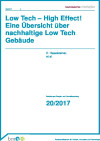
In dieser Studie wurden Ansätze von Low Tech Gebäuden näher betrachtet und besonders innovativ und repräsentativ erscheinende Konzepte detailliert dokumentiert. Ziel war es, den derzeitigen Stand der Technik und das vorhandene Know-how und Wissen anhand realisierter Beispiele aufzuarbeiten sowie Potenziale zur Weiterentwicklung aufzuzeigen.
Schriftenreihe
20/2017
Edeltraud Haselsteiner, Andrea Bodvay, Susanne Gosztonyi, Anita Preisler, Michael Berger, Bernhard Gasser
Herausgeber: BMVIT
Deutsch, 192 Seiten
Downloads zur Publikation
Evaluierung Visionärer Architekturkonzepte
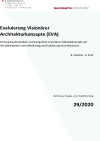
Prüfung bauphysikalisch und energetisch innovativer Gebäudekonzepte auf ihre Machbarkeit unter Monitoring und Evaluierung eines Mock-Ups.
Schriftenreihe
29/2020
B. Sommer, U. Pont, et al.
Herausgeber: BMK
Deutsch, 71 Seiten
Downloads zur Publikation
Optimierung der SOLARenergienutzung in URbanen Energiesystemen (URSOLAR)
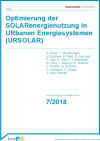
URSOLAR stellt EntscheidungsträgerInnen eine Roadmap zur integrierten urbanen Solarenergie-nutzung zur Verfügung. Es wird aufgezeigt, wie Photovoltaik (PV) und Solarthermie angepasst an infrastrukturelle und rechtliche Gegebenheiten in idealtypischen Stadtquartieren aus ökonomischer, ökologischer und sozialer Sicht sowie unter Berücksichtig von Stakeholder-Interessen optimal ge-nutzt werden können.
Schriftenreihe
7/2018
A. Posch, T. Brudermann, M. Buchner, E. Fleiß, D. Geringer, P. Hart, S. Hatzl, T. Kallsperger, G. Lang, T. Mayrold, E. Meißner, C. Reischl, G. Schnedl, S. Seebauer, K. Stöger, A. Würz-Stalder
Herausgeber: BMVIT
Deutsch, 137 Seiten
Downloads zur Publikation
Machbarkeitsanalyse zertifizierte Plus-Energie-Quartier-Sanierung des denkmalgeschützten Otto-Wagner-Areals (OttoWagner-ArealPlus)
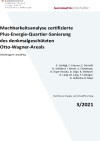
Entwicklung eines innovativen denkmalschutzverträglichen Sanierungskonzepts zur Transformation des Wiener Otto Wagner-Areals in ein Plus-Energie-Quartier. Das Jugendstil-Juwel umfasst eine Fläche von rund 50 Hektar, 70 Gebäude und eine Brutto-Grundfläche von rund 200.000 m². Der Lösungsansatz umfasst dabei höchste Energieeffizienz- und Komfortanforderungen.
Schriftenreihe
3/2021
K. Schlögl, C. Kresser, E. Schriefl, H. Schöberl, I. Artner, S. Chatterjee, D. Ürge-Vorsatz, D. Ürge, K. Stieldorf, F. Gharakhanzadeh, I. Stieldorf, G. Lang, M. Lang, T. Lebinger, G. Jedliczka, B. Mayr
Herausgeber: BMK
Deutsch, 162 Seiten
Downloads zur Publikation
Langzeitevaluierung des Energieverbrauchs von 100 energieeffizienten Gebäuden in Österreich als repräsentativer Querschnitt österreichischer Leuchtturmobjekte (LZE 100 Leuchtturmobjekte)
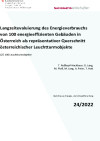
Erfassung, Auswertung und Analyse von Energieverbrauchsdaten von 100 energieeffizienten Gebäuden in Österreich über eine Betriebszeit von 3 bis 25 Jahren als repräsentativer Querschnitt der österreichischen Leuchtturmobjekte. Differenzierung nach Gebäudetypen, Energieträger und Ermittlung der realen Treibhausgas-Emissionen. Vergleich der gemessenen Verbräuche zu Benchmark-Werten.
Schriftenreihe
24/2022
T. Roßkopf-Nachbaur, G. Lang, M. Ploß, M. Lang, A. Peter, T. Hatt
Herausgeber: BMK
Deutsch, 143 Seiten
Downloads zur Publikation
PEQBacker: Integrated District Planning - Enabler on the way to a Plus-Energy District
Development of guidelines for the implementation of Plus-Energy District coordination units based on research of success factors, exploration of mission elements of existing structures and consultation of a broad stakeholder group with the goal of increasing the transformation of existing and emerging neighbourhoods toward Plus-Energy Districts.
UrbanEnergyCells - Requirements for the implementation of energy cells in future energy system designs
The transformation of the currently hierarchical electricity system into a renewable, decentralized electricity system poses major challenges for the actors in the energy industry and society. Most of the installed decentralized renewable energy sources are installed in rural areas, due to easier legal implementation and shorter decision-making pathways. However, the energy density in urban areas is significantly higher, resulting in a transport of electrical energy to the consumption centers.
Enerspired Cities - open and harmonized infomation basis for energy oriented urban planning
In "Enerspired Cities" the concept for an automized junction of judicial secured access regulation to (geo-)energy data is elaborated. This will be adapted to the specific situations in the cities of Innsbruck, Salzburg and Vienna and implemented in dedicated pilot applications. The declared aim is the support of urban planning, monitoring and research by an easy and transparent access to base data coming from various sources for a wide range of users.
Urban district heating extended – Development of flexible and decarbonized urban district heating systems
Development of innovative urban district heating systems by integration of long-term thermal storage, large scale heat pumps, large scale solar thermal installations, waste heat recovery and analysis and evaluation by simulation. The results of this project will provide templates for technology selection, system design and merit order for new urban district heating areas.
Digital Submission - Preparation of planning and decision-making processes, digitisation of building permit procedures (D-SUB)
The aim of this project was to develop and evaluate the foundation for the implementation of digital processes for building permit procedures in Styria. The project started with the recording, processing, and validation of the actual processes of building permit procedures of the city of Graz and the municipality of Stainach-Pürgg.
SC_micro-quarters – Planning and modernisation of smart city quarters with a view to energy optimisation and a high quality of life
The SC_micro-quarters project demonstrates possibilities for urban planning and urban quarter development with a view to creating a path to a low carbon city with a high quality of life and good resilience, while taking into account existing and proposed buildings, infrastructures and uses. The central element is the modelling of urban structures at micro-quarter level.
OWA+Quartier - Sustainable refurbishment and energy supply for the historic Otto-Wagner-Areal towards a plus-energy district
Development of thermal and electrical energy supply for the Otto-Wagner-Areal as well as model solutions for construction and building services in order to initiate the redevelopment of the area in the direction of a plus-energy district.
ÖKO-OPT-QUART - Economically optimized control and operating mode of complex energy networks of future city districts
In the project ÖKO-OPT-QUART energy-based, economic and control-orientated models will be developed in order to simulate the operating mode of complex, sustainable energy networks in city districts. For an exemplary configuration these models will be combined to an overall model which allows a realistic economic comparison of different control strategies. The final goal of the project is the development of a method for the systematic design of cost-optimized, predictive control strategies for complex energy networks in city districts.
ECC – EnergyCityConcepts – Development of a methodology and concept for the implementation of sustainable energy systems in cities by the example of Gleisdorf and Salzburg
In the context of this project two concrete model regions (small city Gleisdorf and urban city quarter Salzburg-Schallmoos) will be developed and tested with new methodical approaches (interdisciplinary urban and regional energy planning, modeling and simulation). An ambitious political commitment of both model regions is a 100% renewable or rather CO2-neutral energy supply.
Digitalization in Urban Planning: From Spatial Energy Planning to Digitalization in Construction Engineering (PBM_integrativ)
The project provides a comprehensive overview of conditions and interrelations between administration, economy and planning and to elaborate the most important features and deficits in the flow of relevant information between the different phases of a building’s life cycle - planning, construction and management/administration.
plusenergy-FLAGSHIP: Plus-Energy office building 2.0 - the viadonau headquarters
In the course of this project, various innovations towards a "Plus-Energy Standard 2.0" are to be implemented and combined in an overall concept for the new viadonau headquarters (via donau - Österreichische Wasserstraßen-Gesellschaft m.b.H.).
Salzburg:KanS - Salzburg: Climate-neutral city
Salzburg:KanS aligns the vision and climate protection goals of the city of Salzburg with the climate neutrality targets of the province and estimates the sector-specific CO2 reduction contributions until 2030. Based on these contributions, the project develops implementation strategies for the entire city as well as the focus areas of “climate-neutral mobility” and “climate-neutral neighborhoods”.
